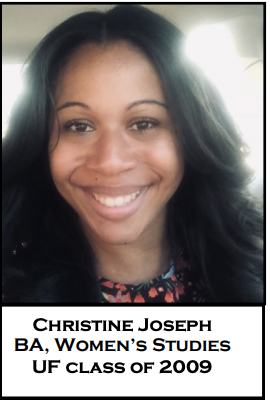 Christine Joseph graduated with the BA in Women’s Studies in 2009. She went on to earn a degree in Mental Health Counseling from Lesley University in 2017. She is an Expressive Arts Therapist at SailFuture group home.
Christine Joseph graduated with the BA in Women’s Studies in 2009. She went on to earn a degree in Mental Health Counseling from Lesley University in 2017. She is an Expressive Arts Therapist at SailFuture group home.
I currently work as an Expressive Arts Therapist at SailFuture group home where I provide counseling to teenage boys during their preparation for sailing journeys to several Caribbean islands. The boys volunteer their time in those islands to help others and to discover and heal their own inner conflicts through service work and moments of reflection on the sailboat.
Socialization to male gender norms can promote emotional repression in some men and boys. Supportive resources and strategies that focus on attachment, identity, the role of caregivers, and different styles of empathetic relations can help men develop their emotional intelligence. Through the use of Expressive Arts Therapy, young men can grow out of learned gender stereotypes that have impacted them negatively. Expressive Arts Therapy provides individuals with ways of exploring and expressing identity.
From my experience with working at juvenile detention centers and high schools with boys between the ages of 13-20, the expressive arts modalities such as music, bibliotherapy (poetry), art, drama, movement and sand-tray therapy guided my relationship with the young men as well as their relationships with themselves. Having a nonverbal outlet to share your thoughts, concerns, anxieties, and fears has been a crucial intervention tool for this demographic.
My women’s studies education has shaped my whole career. I give special gratitude to Professor Stephanie Evans for directing my growth by challenging every single thought and statement made by the students in her course. Dr. Evans challenged us to think critically about how everything is connected and how there is definitely a crossroad between two or more separate subjects. Because of this, when I was graduating from UF, I was trying to make a decision between taking the leap into pursuing music at a graduate level (I was already a trained classical pianist) or a health profession (health was a broad domain, but I knew I was interested in certain fields under that umbrella). I chose music and found Music Therapy, which then led me to Expressive Arts Therapy after attending Berklee College of Music in 2011.
Dr. Evans’ lessons proved to be true; everything was connected. I was able to bridge music and health. Dr. Evans also always emphasized the phrase, “Now what?” as a reminder to ask myself if I am staying current with today’s issues, what do I do with these issues? Where do I go from here? It is pertinent for my growth as a therapist to move this information forward, share, and actively make changes when necessary to benefit the youth I work with and their communities.